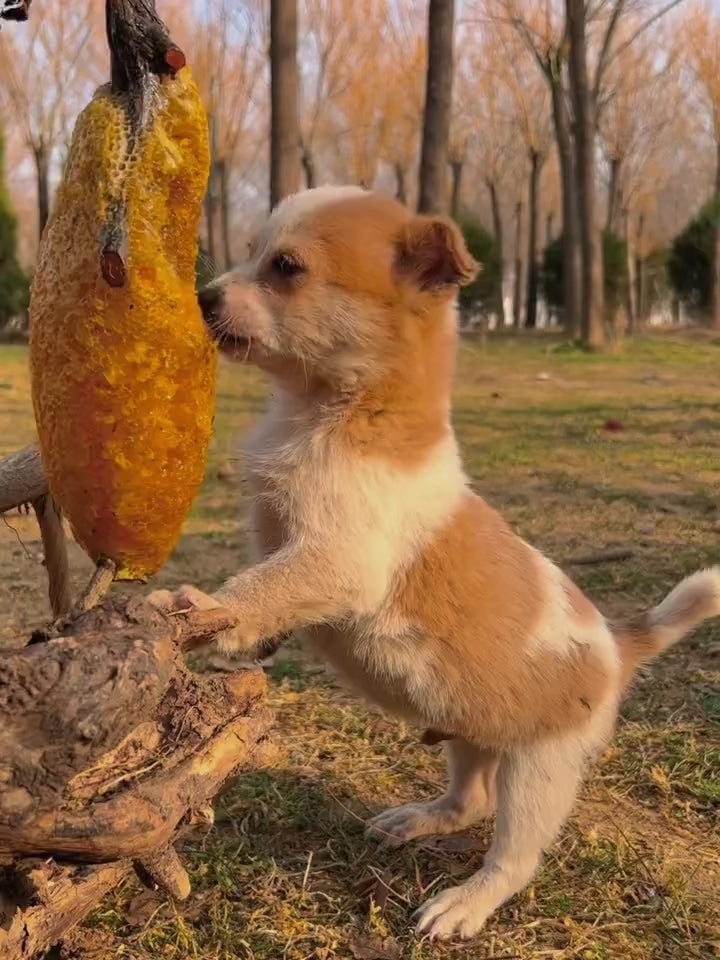1.Conclusion (Quick Answer)
(1)First, let's talk about the conclusion:
Can dogs eat marshmallows? No, dogs should not eat marshmallows, as they are high in sugar and often contain artificial additives, such as xylitol, which is toxic to dogs. While plain marshmallows made of sugar, gelatin, and cornstarch may not be immediately harmful in small quantities, they provide no nutritional value and can contribute to weight gain, dental issues, and potential digestive discomfort. For this reason, marshmallows are not a safe or healthy treat for dogs.
(2)Which Ingredients in Marshmallows Are Toxic to Dogs?
Xylitol (Artificial Sweetener)
- Why It’s Toxic: Xylitol is a common artificial sweetener found in sugar-free marshmallows and other products like gum and candy. It is extremely toxic to dogs because it causes a rapid release of insulin, leading to severe hypoglycemia (low blood sugar). In higher doses, it can cause liver failure.
- Potential Risks: Vomiting, Weakness, Seizures. In severe cases, it can be fatal.
High Sugar Content:
- Why It’s Harmful: Even if a marshmallow doesn’t contain xylitol, its high sugar content can harm dogs over time. Dogs metabolize sugar less efficiently than humans, and excessive sugar can lead to obesity, diabetes, and dental problems.
- Potential Risks: Weight gain and obesity, Tooth decay and gum disease, Blood sugar spikes, which may lead to hyperactivity or lethargy.
Artificial Additives and Preservatives:
- Why It’s Harmful: Marshmallows often contain artificial flavors, colorings, and preservatives that are not dog-friendly. These can upset your dog’s digestive system or put extra stress on their liver over time.
- Potential Risks: Diarrhea or vomiting, Allergic reactions (e.g., itching, swelling), Long-term liver damage from repeated exposure to harmful additives.
Sticky and Soft Texture:
- Why It’s Dangerous: The sticky texture of marshmallows can pose a choking hazard, especially for small dogs or dogs that tend to gulp their food. Undigested marshmallows can also cause blockages in the digestive tract.
- Potential Risks: Choking, Intestinal obstruction or bloating.
(3)Important Considerations: What to Do If Your Dog Accidentally Eats Marshmallows
Check the Ingredients:
- Look for Xylitol: If the marshmallows contain xylitol, this is an emergency. Xylitol is highly toxic to dogs, even in small amounts.
- Action: Contact your veterinarian or an emergency animal poison control hotline (such as ASPCA Poison Control) immediately.
Watch for Symptoms:
- Xylitol poisoning symptoms: Vomiting, Weakness or lethargy, Seizures, Collapse.
Do Not Induce Vomiting (Unless Advised by a Vet):
- Inducing vomiting can sometimes cause more harm than good, especially if the marshmallows contain xylitol or other toxic additives. Only do so if specifically instructed by your veterinarian.
Provide Fresh Water:
- Encourage your dog to drink fresh water to help dilute any ingested sugar and reduce the risk of dehydration, especially if your dog shows mild digestive upset.
Prevent Future Incidents:
- Keep marshmallows and other sweets out of your dog’s reach at all times.
Educate family members and guests about not feeding dogs marshmallows or any sugary treats.
2. Personal Experience: My Dogs and Marshmallows

A close friend of mine once had a surprising and eye-opening experience with his dog and marshmallows. Out of curiosity, and unaware of the potential risks, he decided to feed his dog a small piece of marshmallow. At the time, he didn’t know anything about the potential dangers marshmallows could pose to dogs and assumed they were harmless.
However, that same evening, his dog began to show troubling symptoms. The dog appeared lethargic and showed signs of digestive upset, including diarrhea. Concerned about the sudden change in his dog’s health, my friend rushed his pet to the veterinarian for emergency care. Fortunately, because he had only given his dog a very small piece of marshmallow, the situation was manageable, and the dog recovered without any lasting issues.
This experience served as a valuable lesson for my friend—and for me. It highlighted how important it is to understand the risks associated with feeding dogs human snacks, even seemingly harmless ones like marshmallows. It also reinforced the importance of acting quickly and seeking veterinary care at the first sign of trouble.
3.What Types of Sweet Treats Can Dogs Safely Eat?
While dogs should avoid most human candies and sugary treats, there are a few dog-friendly alternatives that can satisfy their occasional craving for something sweet without compromising their health.
Fruits (In Moderation):
- Many fruits are naturally sweet and safe for dogs to eat. They also provide vitamins, minerals, and fiber, making them a healthier option for a treat. However, always give fruits in moderation and ensure there are no seeds, pits, or toxic parts.
- Safe Fruits for Dogs: Apples (remove seeds and core), Bananas, Blueberries, Strawberries, Watermelon (seedless), Pears (remove seeds).
- Fruits to Avoid: Grapes and raisins (toxic to dogs), Cherries (pits contain cyanide),Avocados (contain persin, which can be harmful).
Honey (In Small Quantities):
- Raw, natural honey can be given to dogs in very small amounts as an occasional treat. It’s packed with antioxidants and has anti-inflammatory properties.
- However, it should not be given to puppies or dogs with diabetes due to its high sugar content.


6. Conclusion
(1)Marshmallows are not safe for dogs to eat and should be avoided as a treat. While plain marshmallows without toxic ingredients like xylitol may not cause immediate harm in small amounts, they provide no nutritional value and can lead to health issues such as weight gain, digestive upset, and dental problems. Additionally, marshmallows often contain harmful additives, high sugar levels, and, in some cases, toxic ingredients like xylitol, which is extremely dangerous for dogs.
(2)In summary, marshmallows are not a suitable snack for dogs, and it’s best to opt for healthier, dog-friendly alternatives such as fruits, sweet vegetables, or specially formulated dog treats. By choosing safe and nutritious options, you can ensure your dog’s health and happiness without risking their well-being.


Share: